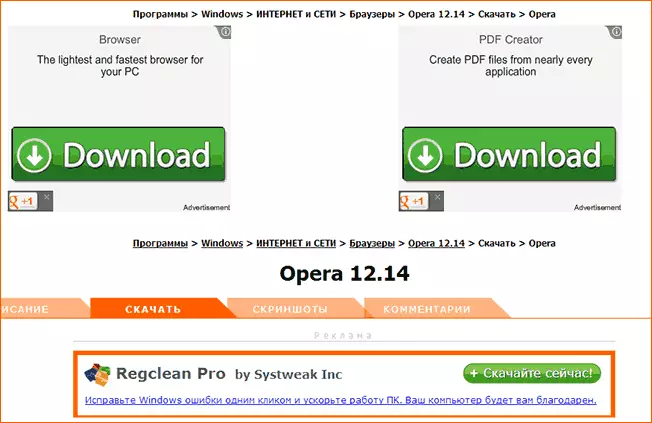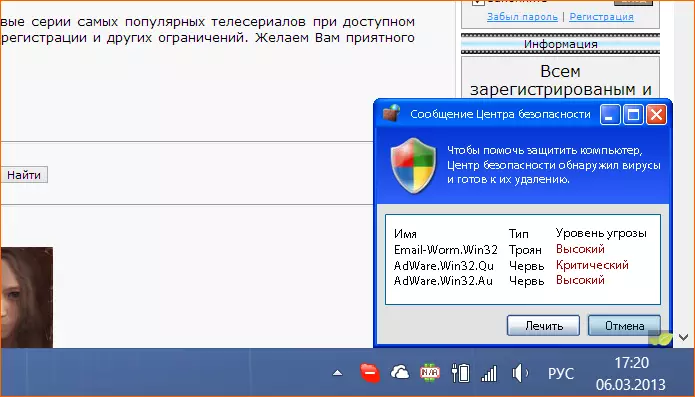
See also: Online Screening Computer for Viruses
Social engineering
If you refer to Wikipedia, you can read that social engineering is a way to obtain unauthorized access to information without using technical means. The concept is much wider, but in our context - receiving a virus through the browser, it in general implies the provision of information to you in this form so that you independently download and launched a malicious program on your computer. And now more about specific examples of distribution.False download links
I have repeatedly wrote that "free download without SMS and registration" is a search query, most often leading to infection with viruses. On the overwhelming majority of unofficial sites to download programs offered to download drivers for everything, you can see many links "Download" not leading to downloading the desired file. At the same time, to figure out which button "download" allows you to load the desired file by a non-specialist not easy. An example is in the picture.

Many links "download"
The results, depending on which site, this is happening, can be completely different - starting from the set of programs installed on the computer and are in the autoload, the behavior of which is not too conscientious and leads to a noticeable slowdown of the computer at all and Internet access in particular: MediaGet, Guard.Mail.Ru, Numerous bars (panels) for browsers. Before receiving viruses, blocker banners and other unpleasant events.
Your computer is infected

False virus notice
Another common way to get a virus on the Internet is on any site you see a pop-up window or even a window similar to your "conductor", which reports that viruses, trojans and other evil spirits are found on the computer. Naturally, it is proposed to easily correct the problem, for which you need to press the appropriate button and download the file, or do not even download, but simply when requesting the system to allow you to perform this or that action with it. Considering that the usual user does not always pay attention to the fact that there is no antivirus about the problems, but Windows Account Control Messages are usually skipped by pressing "Yes", in such a way to catch the virus.
Your browser is outdated

Similarly to the previous case, only here you will see a pop-up window that tells that your browser is outdated and it must be updated, for which the corresponding link will be given. The consequences of this renewal of the browser are often sad.
Need to install a codec for watching video
Looking for "watch movie online" or "Interns 256 series online"? Be prepared for the fact that you will be asked to download any codec to play this video, you download, and, in the end, it will be not a codec at all. Unfortunately, I don't even know how to competently explain how to distinguish the normal Silverlight or Flash installer from malicious programs, although it is quite simple for an experienced user.Automatically downloadable files
On some sites, you can also encounter the fact that the page will try automatically download any file, and you most likely have not been pressed anywhere to download it. In this case, it is recommended to cancel the download. Important moment: not only exe files are dangerous to start, such file types are much larger.
Unprotected browser plugins
Another common way to get a malicious code through a browser is various safety holes in plugins. The most famous of these plugins is Java. In general, if you do not have a direct need, it is better to completely remove Java from the computer. If you do not do this, for example, because you need to play Minecraft - you only delete Java plugin from the browser. If you need Java and in the browser, for example, you are using any application on the Financial Management Website, you must at least respond to the Java update notifications and set the latest version of the plugin.Browser plugins such as Adobe Flash or PDF Reader also often have security challenges, however, it should be noted that Adobe is much faster to respond to identified errors and updates are supplied with enviable regularity - just do not postpone their installation.
Well, most importantly, in terms of plugins - delete all the plugins from the browser that you do not use, and you are using updated.
Bowser Safety Holes

Install the latest browser version
Problems of security of the browsers themselves also allow you to load a malicious code to your computer. To avoid this, follow the simple tips:
- Use the latest browser versions downloaded from the official sites of manufacturers. Those. Do not look for "Download the latest version of Firefox", and just go to Firefox.com. In this case, you will receive a really latest version, which will later be updated independently.
- Have antivirus on your computer. Paid or free - to solve you. It is better than no. Protector Windows 8 - can also be considered good protection if you do not have any other antivirus.
Perhaps on this end. Summing up, I want to note that the most frequent reason for the appearance of viruses on a computer through the browser is still the own actions of users caused by one or another deception on the site itself, as stated in the first section of this article. Be careful and careful!
